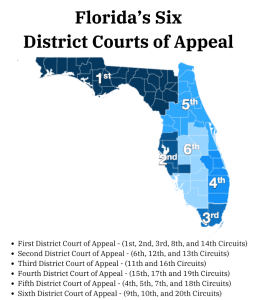As reviewing courts, Florida’s District Courts of Appeal serve as vital pillars of Florida’s judicial system, playing a crucial role in ensuring justice is served efficiently and effectively.
History of Florida’s District Courts of Appeal

In order to alleviate the burden on the Florida Supreme Court, Florida amended Article V of the Florida Constitution to establish the Florida District Courts of Appeal in 1957. Initially, there were three District Courts of Appeal: the First District Court of Appeal (“DCA”) in Tallahassee, the Second DCA in Lakeland, and the Third DCA in Miami.
While the District Courts of Appeal provided some relief to the Florida Supreme Court and made appellate justice more readily available to litigants, the desired finality was not accomplished with the November 6, 1956 amendment to Article V of the Florida Constitution and the original intended function of the District Court of Appeals eroded over time.
Recognizing the desired result was not reached, Article V was again amended on March 11, 1980. This amendment expressly limited the mandatory review of the Florida Supreme Court, outlined its discretionary review powers, and revised the jurisdiction of the District Courts of Appeal.
As Florida’s population continued to grow, additional District Courts of Appeal were created. The Fourth DCA was created in 1965; the Fifth DCA in 1979; and the Sixth DCA in 2023. Today Florida still has six District Courts of Appeal.
Today’s District Courts of Appeal
The primary purpose of Florida’s District Courts of Appeal is review of trial court, or lower tribunal, decisions. Prior to the creation of Florida’s District Courts of Appeal, the right of review guaranteed litigants was an obligation of the Florida Supreme Court. Today, the Florida Supreme Court has broad discretion over the cases it hears. Although Florida’s District Courts of Appeal are not given the depth of discretion of the Florida Supreme Court, not every matter or case is suitable for appeal. If review is desired there are strict rules and deadlines governing access to review.
An appeal in Florida is not an opportunity for a party to entirely relitigate a matter: there must be legal error and the legal error must have been of sufficient significance to impact the outcome of the matter. Appeals in Florida are not limited to review of the final judgment or ultimate result of the case. There are several other decisions for which appellate review is appropriate including, but not limited to, decisions regarding injunctive relief, disqualification of counsel, class certification, motions for leave to amend to assert claims for punitive damages, grant of a motion to compel discovery, and many other non-final decisions.
The right to appellate review in Florida is not unlimited. The importance of timely seeking appellate relief cannot be overstated. For individuals, there is no requirement to hire an attorney to appeal an unfavorable trial court, or lower tribunal, decision. However, appellate counsel can be incredibly helpful in ensuring an appeal is appropriate, timely, and as effective as possible.
Florida’s District Courts of Appeal serve several essential functions:
Ensure Fairness and Consistency: District Courts of Appeal provide an avenue for parties who feel the trial court, or lower tribunal, erred in a decision. By scrutinizing lower court rulings, these appellate courts help ensure justice is administered fairly and consistently across the state.
Interpret the Law: One of the most significant responsibilities of District Courts of Appeal is to interpret and apply the law. Through their rulings, they establish legal precedents to guide future trial court decisions, attorneys, and litigants.
Correct Errors: District Courts of Appeal have the authority to overturn trial court, and other lower tribunal, decisions deemed to be erroneous or contrary to law.
Protect Rights and Liberties: The appellate courts serve as guardians of individual rights and liberties by ensuring that legal proceedings are conducted fairly and in accordance with the law. This oversight helps safeguard due process and the principles of justice for all citizens.
Enhance Public Confidence: By providing an avenue for review and redress, District Courts of Appeal contribute to public trust and confidence in the judicial system. A transparent and impartial approach to resolving legal disputes fosters faith in the rule of law and the integrity of Florida’s courts.
Final Thoughts
Florida’s District Courts of Appeal play a vital role in the state’s judicial system by providing a forum for intermediate appellate review, interpreting the law, promoting efficiency, correcting errors, protecting rights, and enhancing public confidence in the legal process. As essential components of the state’s judiciary, these appellate courts contribute to the fair and effective administration of justice in Florida.

